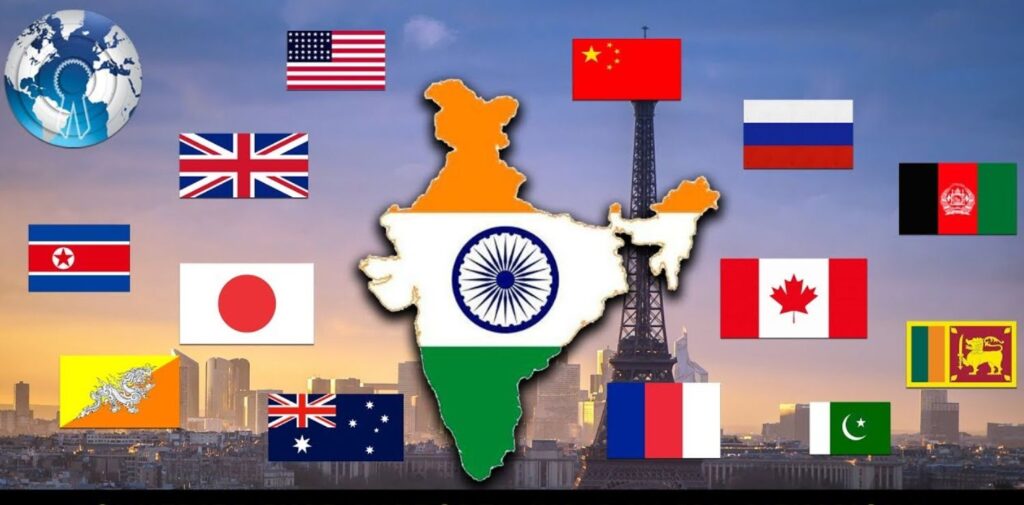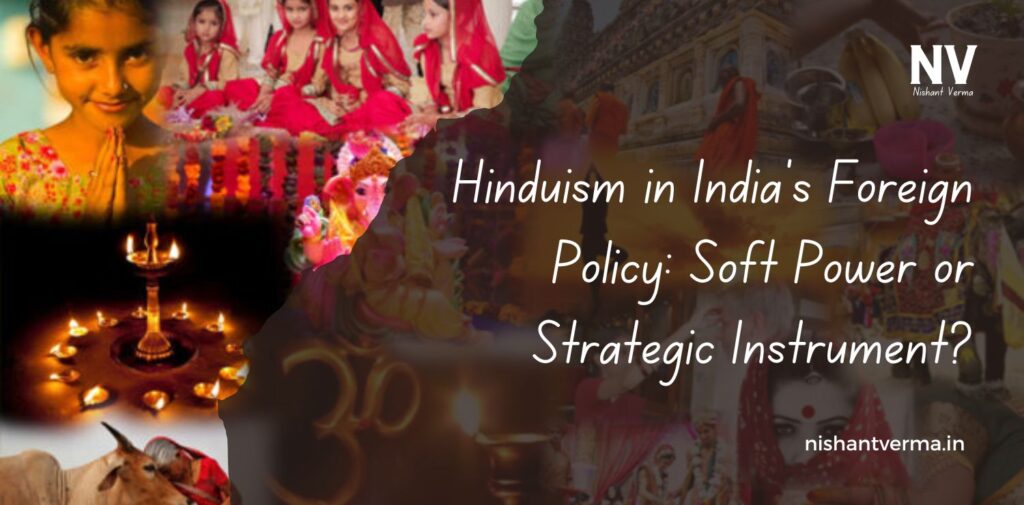India, a nation known for its rich cultural heritage and diverse population, has long been recognized as a global power. Over the years, India foreign policy has evolved to reflect not only its economic and military strength but also its deep-rooted spiritual and cultural traditions. One of the most significant elements of India’s cultural identity is Hinduism, the dominant religion in the country.
Hinduism, with its ancient history and widespread influence, plays a complex role in shaping India foreign policy. But how exactly does Hinduism influence India’s interactions with the rest of the world? Is it a tool for soft power, or is it used as a strategic instrument in global diplomacy? The answer is not simple and requires a closer look at how Hinduism is woven into the fabric of India’s foreign relations.
Hinduism and India’s Soft Power
To understand the role of Hinduism in India foreign policy, it is important to first understand the concept of soft power. The term soft power refers to the ability of a country to influence others through cultural appeal, values, and diplomatic engagement, rather than through military or economic force. India’s rich cultural history, including its traditions, music, art, literature, and philosophy, has contributed significantly to its soft power. Among these cultural elements, Hinduism stands out as a central component.
Hinduism’s influence can be seen in various aspects of India foreign policy, particularly in its efforts to project itself as a peaceful, inclusive, and spiritually rich nation. This aspect of Hinduism is not only central to the Indian identity but is also a key part of its international image. By emphasizing its religious philosophy of tolerance, non-violence (Ahimsa), and respect for all life, India presents itself as a model for peaceful coexistence in an often-divided world.
For example, India has used its spiritual and philosophical teachings, including those of leaders like Mahatma Gandhi, to promote peace and non-violence in its diplomatic engagements. Gandhi’s principles of Satyagraha (truth force) and Ahimsa have become symbols of India’s commitment to non-violent resistance and peaceful diplomacy, resonating with global audiences.
Furthermore, India’s emphasis on Hindu traditions, such as yoga and meditation, has found a global following, strengthening its cultural diplomacy. The growing popularity of yoga worldwide has not only promoted physical health but has also created an image of India as a land of spiritual wisdom. This helps to foster goodwill towards India in countries across the globe, further enhancing its soft power.

Hinduism and India’s Strategic Interests
While Hinduism’s role in India foreign policy as a soft power is widely acknowledged, it also serves as a strategic instrument in some cases. India foreign policy often reflects a careful balance between its cultural values and its national interests, including security, economic growth, and regional influence. In certain instances, Hinduism has been used to build stronger ties with other nations, particularly those with significant Hindu populations, such as Nepal, Indonesia, Mauritius, and Fiji.
Strengthening Ties with Hindu-majority Countries
India shares strong cultural and historical bonds with countries where Hinduism has a significant presence. For instance, Nepal, the birthplace of Lord Buddha, has deep spiritual connections with India. The two countries share a long-standing relationship based on religious, cultural, and historical ties. India has used these shared religious values to strengthen its diplomatic ties with Nepal, often emphasizing its role as a protector of Hindu culture and traditions in the region. At the same time, India’s engagement with Nepal also involves economic cooperation, infrastructure development, and security collaboration, with Hinduism playing a role in solidifying the cultural foundation of the relationship.
Similarly, India has strengthened its relationship with countries like Indonesia and Mauritius through religious and cultural diplomacy. Indonesia, although a Muslim-majority country, has a significant Hindu minority, particularly on the island of Bali, which has led to cultural exchanges between the two nations. In Mauritius, Hinduism is the dominant religion, and India has often used its cultural ties to build closer political and economic relations. Through these relationships, India promotes the idea of a shared cultural heritage that binds these countries together, creating a platform for deeper cooperation.

Hinduism and Regional Politics
Hinduism also plays a role in India’s regional diplomacy, particularly in South Asia. India foreign policy towards neighbouring countries, such as Pakistan, Sri Lanka, and Bangladesh, is often influenced by religious and cultural factors. For example, the issue of religious minorities in Pakistan has been a point of contention in India-Pakistan relations, with India portraying itself as the protector of religious freedom for Hindus in Pakistan.
In Sri Lanka, India foreign policy has been shaped by its historical and cultural connections with the Tamil Hindu population in the northern and eastern parts of the island. While the Sri Lankan Civil War was primarily about ethnic tensions, India’s support for the Tamil population was partly based on shared cultural and religious ties.
At the same time, India foreign policy has also been shaped by its desire to maintain a secular image, especially when dealing with countries where religion and politics are intertwined. India often has to balance its support for Hinduism with the need to respect the religious diversity in its own country and abroad.
Hinduism and Global Diplomacy
India foreign policy also seeks to engage with global powers in ways that highlight its cultural and religious heritage. During international forums, India often presents itself as a nation that represents ancient wisdom, offering solutions to global challenges based on its spiritual teachings. For example, India’s emphasis on environmental sustainability, through concepts like Dharma (moral responsibility) and respect for nature, is often linked to its Hindu heritage. This message resonates with international audiences concerned about climate change and environmental issues.
Furthermore, India’s promotion of Hinduism through platforms like the United Nations and other international organizations often focuses on global peace, interfaith dialogue, and cultural exchange. The Indian government has also worked to promote the celebration of important Hindu festivals, such as Diwali, on the global stage. These cultural initiatives help foster international goodwill and project India as a vibrant, inclusive society.

Hinduism’s Role in Internal and External Politics
Hinduism’s influence on India foreign policy is not always straightforward. Domestic political factors also play a role in how Hinduism is presented on the global stage. In recent years, there has been increasing use of Hindu nationalism in Indian politics, which can sometimes complicate India’s foreign relations, especially with countries that have large Muslim populations or those that are wary of the rise of religious nationalism.
For instance, India’s handling of the Kashmir issue, with its large Muslim population, is often viewed through the lens of its Hindu-majority identity. Similarly, the treatment of religious minorities within India, including Muslims and Christians, has sometimes affected India’s image in the international community. These internal dynamics can influence how Hinduism is presented in foreign policy, especially in countries where religious tolerance and secularism are highly valued.
Conclusion: Hinduism in India Foreign Policy
The role of Hinduism in India foreign policy is multifaceted. On one hand, it functions as a form of soft power, helping to promote India’s cultural and spiritual influence worldwide. On the other hand, Hinduism also plays a role in India’s strategic diplomacy, helping to build closer ties with countries that share cultural or religious affinities. However, Hinduism’s influence is not without its complexities, as India must balance its religious identity with its broader goals of secularism, democracy, and global engagement.
Ultimately, Hinduism is both a soft power tool and a strategic instrument in India foreign policy, but its role depends on the context and the specific diplomatic goals India seeks to achieve. Whether as a force for global peace or a bridge to strengthen regional ties, Hinduism will likely continue to be an important part of India’s approach to the world.




